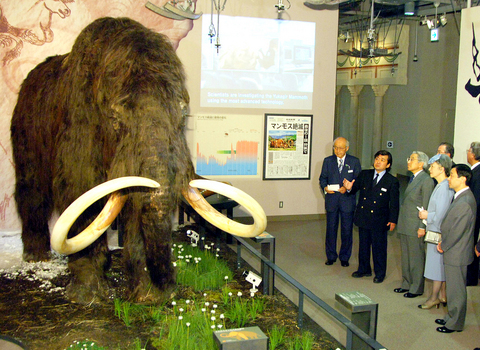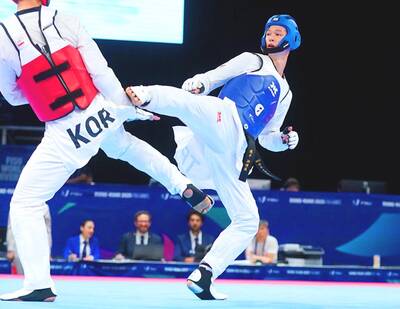Central Japan's Aichi region, cradle of the samurai and silent force of the nation's economy, will be under a rare global spotlight that could help it grow even further when it hosts the World Exposition which opens tomorrow.
Aichi prefecture, known as "the manufacturers' kingdom," has long been a locomotive for Japan's economy by fostering textile industries before World War II and afterward shifting its focus to automobiles led by titan Toyota.
The usually low-key province is expected to see some 15 million visitors during the Expo, a showcase of technology and innovation with exhibits from more than 120 countries in a forest park.

PHOTO: AP
"The Aichi economy is literally the dynamo of the Japanese economy as its earnings and spending have enriched not only the region but the entire country," said Toshihiro Uchida, an analyst at UFJ Research Institute.
The GDP of Aichi, some 250km west of Tokyo, is estimated at US$270 billion, a near match for that of Taiwan or Russia.
The region's trade surplus in 2003 stood at ?7.6 trillion (US$72 billion), accounting for 60 percent of that of the nation. Aichi shipped a record ?35 trillion in manufactured goods in 2003, the 27th straight year it was Japan's top industrial region.
The prefecture, whose capital is Nagoya, has the nation's fourth largest population at 7.3 million and an economically ideal infrastructure with a fertile plain and well-placed harbors.
Aichi produced some of Japan's key samurai knights including Tokugawa Ieyasu, the shogun who emerged from Japan's civil war era in the late 16th century to found a seat of power in what is now the capital Tokyo.
But modern-day Aichi -- halfway between Japan's two largest cities, Tokyo and Osaka -- has been in the shadows and will relish the attention that comes with the expo.
"Aichi has a great chance to appeal to the world and give an extra boost to its powerful economy by hosting the expo," Uchida said.
The economic impact of the exposition, the region's first major international event, is forecast to top ?2.2 trillion.
The figure includes the positive influence from the construction of Centrair, Japan's third major international airport, which opened last month as a gateway to the exhibition venue.
"Taking advantage of the World Expo, we aim to develop [Aichi] further in a bid to become a Mecca of manufacturing in the world," said Katsuhiro Nakagawa, vice chairman of Toyota Motor Corp, Japan's largest company.
One factor seen in Aichi's economic strength is its historically conservative management, which largely avoided the speculation during Japan's economic "bubble" which burst in the early 1990s,triggering a decade of recession.
"Rock-solid management prevented a lot of countries in the region from going on a spree during the bubble," said Yoshihiro Yasui, chairman of Brother Industries Ltd, another of the prefecture's leading companies.
But the counter side is less investment from the rest of the world.
"Traditionally, we have not been good at being appealing," Yasui said. "So our next challenge is to be able to send out a message to the world to introduce our solid spirit as great manufacturers."
The Nagoya Chamber of Commerce and Industry, Aichi's biggest business lobby, has taken an initiative to welcome foreign investment in the region.
"An important task before us is to emphasize our presence a bit to survive amid global competition with other cities," chairman Sokichi Minoura said.
Uchida said diversification was key for the region: "Aichi either swims or sinks with Toyota."
"As long as Toyota remains strong, the region is safe. But no one can tell what will happen to Toyota in a decade," he said. "Aichi has to take action now. Prevention now is better than a cure later."

The paramount chief of a volcanic island in Vanuatu yesterday said that he was “very impressed” by a UN court’s declaration that countries must tackle climate change. Vanuatu spearheaded the legal case at the International Court of Justice in The Hague, Netherlands, which on Wednesday ruled that countries have a duty to protect against the threat of a warming planet. “I’m very impressed,” George Bumseng, the top chief of the Pacific archipelago’s island of Ambrym, told reporters in the capital, Port Vila. “We have been waiting for this decision for a long time because we have been victims of this climate change for

MASSIVE LOSS: If the next recall votes also fail, it would signal that the administration of President William Lai would continue to face strong resistance within the legislature The results of recall votes yesterday dealt a blow to the Democratic Progressive Party’s (DPP) efforts to overturn the opposition-controlled legislature, as all 24 Chinese Nationalist Party (KMT) lawmakers survived the recall bids. Backed by President William Lai’s (賴清德) DPP, civic groups led the recall drive, seeking to remove 31 out of 39 KMT lawmakers from the 113-seat legislature, in which the KMT and the Taiwan People’s Party (TPP) together hold a majority with 62 seats, while the DPP holds 51 seats. The scale of the recall elections was unprecedented, with another seven KMT lawmakers facing similar votes on Aug. 23. For a

All 24 lawmakers of the main opposition Chinese Nationalists Party (KMT) on Saturday survived historical nationwide recall elections, ensuring that the KMT along with Taiwan People’s Party (TPP) lawmakers will maintain opposition control of the legislature. Recall votes against all 24 KMT lawmakers as well as Hsinchu Mayor Ann Kao (高虹安) and KMT legislative caucus whip Fu Kun-chi (傅崐萁) failed to pass, according to Central Election Commission (CEC) figures. In only six of the 24 recall votes did the ballots cast in favor of the recall even meet the threshold of 25 percent of eligible voters needed for the recall to pass,

LETTER, FLAG FLAP: A Chinese man and woman reportedly tried to snatch a letter meant for Taiwanese winners, while China’s team took offense at a Taiwanese flag President William Lai (賴清德) yesterday condemned an alleged attempt by two Chinese to snatch a letter of congratulations handed to Taiwan’s taekwondo team after they won silver at the Summer World University Games in Germany on Wednesday. A Chinese man and woman reportedly tried to snatch a congratulatory letter to athletes Hung Jiun-yi (洪俊義), Jung Jiun-jie (鍾俊傑) and Huang Cho-cheng (黃卓乘) from the Ministry of Education, and then argued with reporters. “Why are you taking our things?” reporters asked the pair. “Does that say ‘Chinese Taipei’?” the two Chinese reportedly asked. Following the incident, Sports Administration Director-General Cheng Shih-chung (鄭世忠) wrote on Threads about